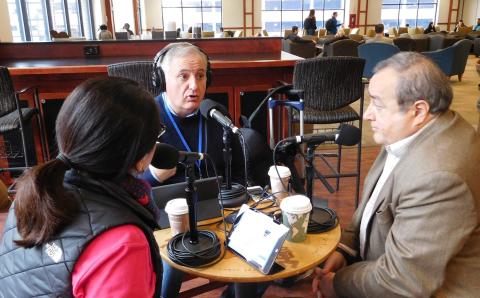America’s largest Protestant denomination, the Southern Baptist Convention, was recently rocked by reports of over 700 cases of sexual abuse by nearly 400 church leaders spanning 20 years. Worse, some denominational leaders knew of the problems but didn’t stop the perpetrators. Indeed, many were repeat offenders who would leave one congregation only to prey on another. This is a horrific, sinful, and gross betrayal of God and God’s people. And we, the Christian Reformed Church, are not immune to such evils.
When Synod 2018 debated Overture 2 last year, nearly every delegate raised a hand to indicate that they knew of someone who had experienced abuse. How many in our churches have suffered physical, emotional, and/or sexual abuse? How many have suffered in silence and have still not reported? How many have left churches that failed to deal adequately with abuse?
Our denomination has an opportunity to better protect the vulnerable among us. As follow-up to Overture 2, a report on addressing the abuse of power in the CRCNA is coming to Synod 2019. It lists 10 recommendations, including requiring mandatory abuse prevention training for anyone entering the ministry, a code of conduct for all ministry staff, and better recordkeeping of cases. These steps are long overdue. If we wish to avoid the Southern Baptists’ fate, we must implement these recommendations.
We have no good excuses not to do so. Pastors should welcome such training and a code of conduct. Pastors are to care for Christ’s flock, and extra accountability measures will help to protect the flock. If our hearts and hands are clean, we have nothing to fear from increased oversight and transparency.
We are talking not only about sexual abuse or physical abuse but also emotional abuse. Can we talk about spiritual bullying? Has bullying occurred in our churches? In our church council rooms? From the pulpit? In our online comment sections? And it’s not just pastors who might abuse; they themselves can be bullied by elders or church members. Anyone can be abusive.
The synodical report also observes cultural factors that can foster abuse of power, such as too much deference to authority, too much loyalty to leaders, or an oversized concern for reputation. So one of its recommendations is to create a culture that prevents the abuse of power. This is an important recommendation, albeit difficult to achieve.
Difficult as it is, we still must try out of faithfulness to Christ’s call to love one another as he has loved us. If ideas have consequences, then we need to trace abusive fruits to their cultural roots and weed them out. In their place, we need to promote ideas and practices that bear good fruits.
Yes, this requires a lot of work. But if we apply the same amount of energy that goes into our hypervigilance over certain sexual sins to preventing abuse of power in our circles, we would make huge strides. Otherwise, our spiritual hypocrisy will be exposed.
I pray that synod and our churches will do the right thing and implement steps to protect people who are vulnerable. Too much pain and suffering has already occurred. But I also trust in God’s resurrection power to bring life and good out of pain and suffering.
About the Author
Shiao Chong is editor-in-chief of The Banner. He attends Fellowship Christian Reformed Church in Toronto, Ont.
Shiao Chong es el redactor jefe de The Banner. El asiste a Iglesia Comunidad Cristiana Reformada en Toronto, Ont.
시아오 총은 더 배너 (The Banner)의 편집장이다. 온타리오 주 토론토의 펠로우쉽 CRC에 출석한다.
You can follow him @shiaochong (Twitter) and @3dchristianity (Facebook).








